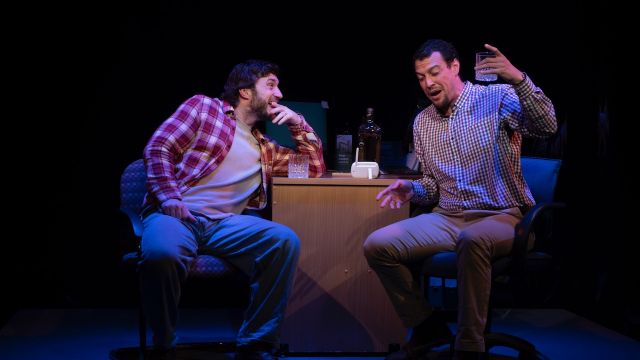A Case for the Existence of God
Two men sit across an office desk. They could not be more different. We think. One is Keith (Kevin Hofbauer), a mortgage broker given to financial jargon and acronyms; he’s apparently confident, very definite, wears preppy clothes, has a neat beard. The other man is Ryan (Darcy Kent): reticent, apologetic, scruffy hair, faded tartan shirt, scuffed Redwing boots. Ryan wants a loan to buy some land – twelve acres his family owned long ago – for himself and his fifteen-month-old daughter Krista. We want Ryan to get that land, but we suspect from the start he’s not going to get it… He’s a shit kicker shift worker in the throes of a divorce from his educated wife, trying desperately to hang onto custody of his daughter.

Then we notice – if we haven’t already – that this cramped office is surrounded by water. It’s an island. Keith and Ryan are – metaphorically – marooned. It’s a bold design choice for this otherwise naturalistic play, but no one draws attention to it, and it lifts the story into a wider world; it emphasises the particular predicament and precarity of these two men. Around them, closing them in, are walls of shiny black plastic on which the lights of their town – Twin Falls, Idaho – occasionally flash and twinkle – but far away… The set design is by Jeremy Pryles – and his costume choices – so specific in detail - are just right.
Keith comes from a well-off, travelled family and has an economically useless degree in early music and English – and here he is, an employee mortgage broker. Other factors ensure his isolation. He’s black. He’s gay but has no partner. Now he has fostered a sixteen-month-old girl Willa from birth, and he wants – he needs - to adopt her. Willa’s mother is a crack head, but Keith is terrified he’ll lose little Willa. An innocuous phone call from his social worker brings on what looks like a panic attack.

It’s Ryan, way less educated and articulate than Keith, but burdened with far less character armour, who intuits that he and Keith share a specific kind of loneliness. It’s startling coming from Ryan, but we immediately believe it. Apart from their daughters it is what creates their bond. It is the great achievement of A Case for the Existence of God that playwright Samuel D Hunter creates these disparate characters and then credibly brings them together in a kind of fragile, almost willed friendship, revealing their backstories credibly bit by bit (even if there are some holes). But the depiction is not in the least sentimental (though it could be).
There are scenes of the two guys hanging out together – an all-night drinking session, or the two would-be Dads watching their girls in a playground – and realising that these girls will most likely be alive in 2100 – when they, Ryan and Keith, are gone. There’s welcome humour in these scenes, but they are painful too as both men wish they could stop time even while they maintain their hopes.

Director Gary Abrahams elicits performances that at first emphasise difference but then lead us into the almost sealed world – they have no confidantes but each other - of Ryan and Keith. Darcy Kent’s Ryan narrowly avoids pathos by the clarity with which he sees himself – and his love for his daughter. Hofbauer lets us see the fragility, and awkward nerdiness under Keith’s ebullient, gung-ho front.
The play ends with a kind of coda that is surprising but completely in keeping with the play’s themes. Some of the audience were in tears. These characters are touching, not so much because of who they are, but because of their knowledge, like us, of being caught by their pasts, stranded in the present, and hoping for the future.
Michael Brindley
Images: From L to R: Darcy Kent, Kevin Hofbauer. Photographer: Jodie Hutchinson
Subscribe to our E-Newsletter, buy our latest print edition or find a Performing Arts book at Book Nook.

